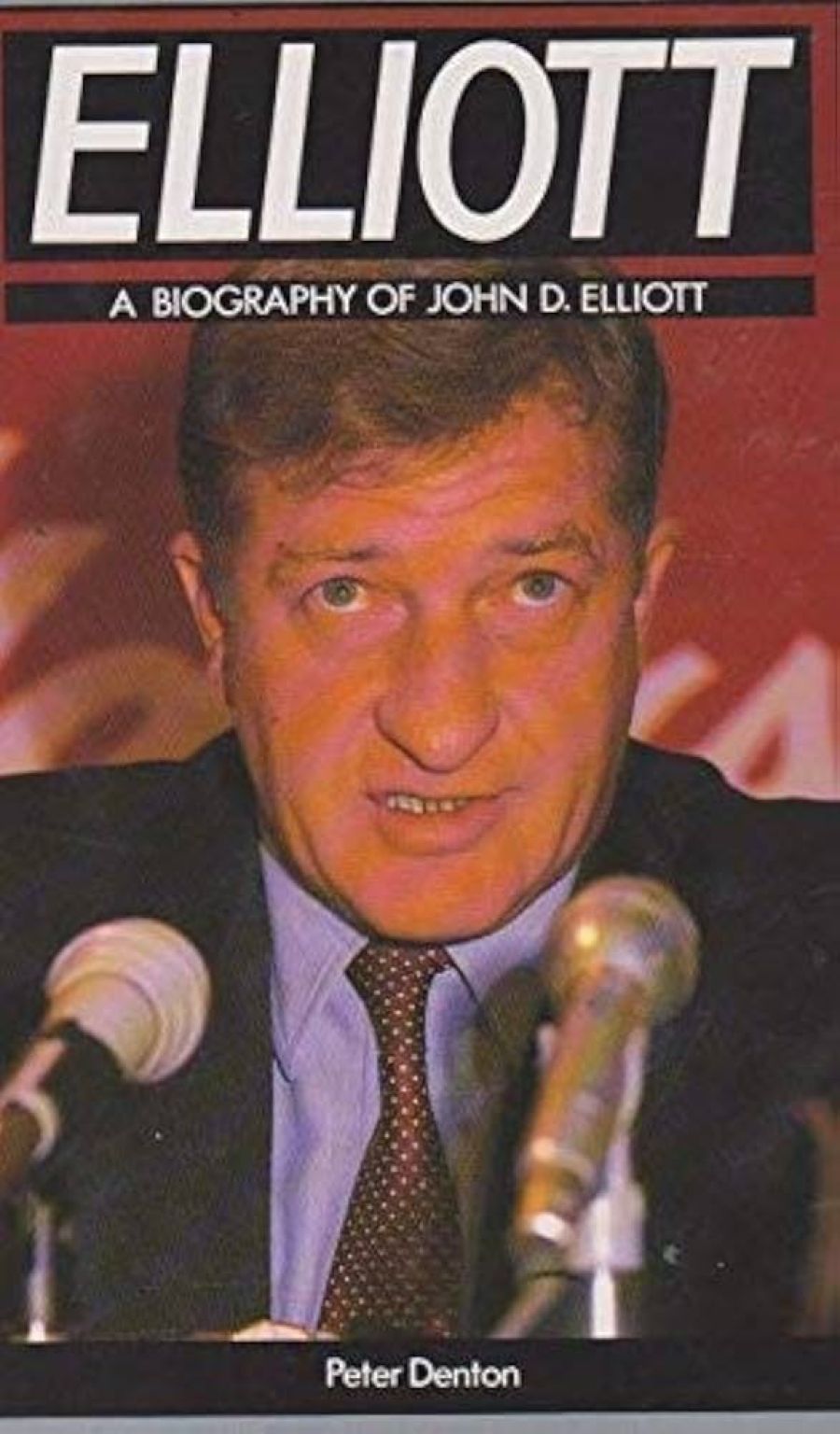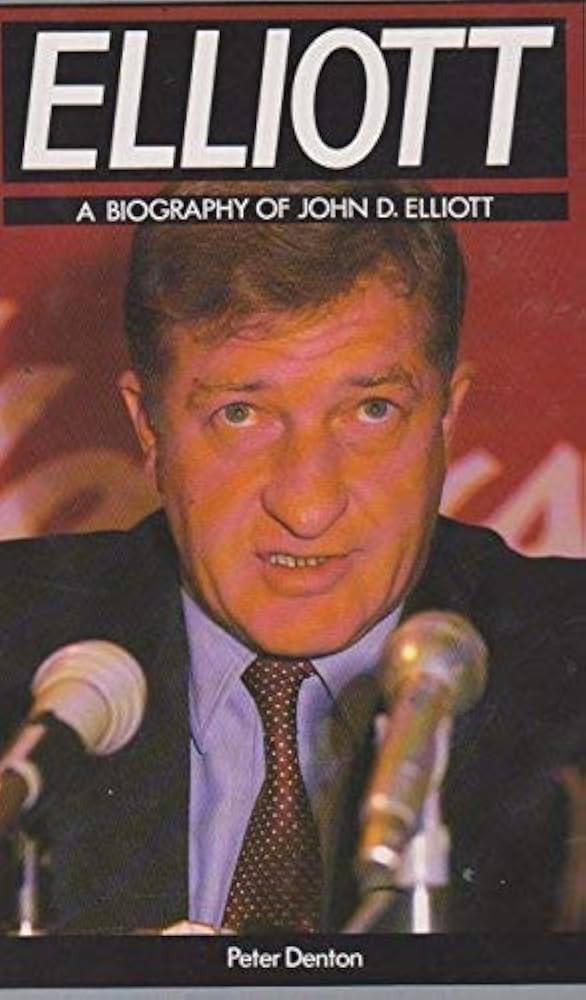
- Free Article: No
- Contents Category: Biography
- Review Article: Yes
- Article Title: Rituals, Superstitions, and Big Men
- Article Subtitle: Business as a spectator sport
- Online Only: No
- Custom Highlight Text:
To start with a different biography: R.M. Kessing’s Elota’s Story: The Life and Times of a Solomon Islands Big Man (UQP, 1978) will tell you the following tale.
- Book 1 Title: Elliott
- Book 1 Subtitle: A Biography of John D. Elliott
- Book 1 Biblio: Little Hills Press, 266 pp, $24.95 hb
- Book 1 Cover Small (400 x 600):

- Book 1 Cover (800 x 1200):

Meanwhile, a young lad by the name of John Dorman Elliott was growing up in the suburb of Kew East in the city of Melbourne. Thanks to careful investments in companies with diverse sources of profit (brewing, finance, farm produce) and modem methods of accounting, Elliott has quickly become one of the country’s leading Big Business Men. His fame in the community is due to his ability to command great profits for his shareholders while at the same time identifying with the interests of the people (beer, cigarettes, football). His greatest triumphs have been the takeovers of moribund companies such as Henry Jones. Elliott is different from those before him in the way he used his contacts with the Melbourne Establishment to introduce radical business methods. He is remembered for saying, ‘Fosters tastes like an angel crying on your tongue.’
Elliott belongs to a rational society, in contrast to ‘Elota whose world is marked by ritual and superstition. Well, maybe. The recent entry onto the media stage (60 Minutes, Good Weekend) of the business tycoons with interesting personalities and distinctive powers makes economic life in Australia resemble a theatrical sport such as wrestling, rather than a dry process of monetary transactions. At a time of economic despair, figures like the aggressive John Elliott, the cool Robert Holmes a Court, the boyish Alan Bond, the powerful Rupert Murdoch, etc., come together on a stage of great ambitions, contests, and, above all, incredible success. It is easy to see them as the fantastic heroes of our threatened Aussie economy. The papers present John Elliott as a rough and ready popular hero, who ‘lets his mind run ahead of his tongue’. No wonder then that there was such an enormous public outcry when John Elliott rubbished Australia as an investment prospect in New York.
The parallels between this situation and the social structure of Big Man societies such as the Solomon Islands are numerous. In both systems the people follow the man with the most yams and the biggest feasts, if not to profit directly then at least compelled by the high drama of his life. In both systems the main virtues are ambition, cunning, and strength. Now a biography of one of our Biggest Businessmen John Elliott, has been published and it is interesting to see if the John Elliott of the book stands up to the John Elliott we read about in the papers.
One of my first impressions in reading John Denton’s biography of Elliott is the grand scale of the action. In the drama of takeovers, bystanders like Robert Holmes a Court seem to have little trouble finding a few million dollars of extra pocket money. Denton finds one of the keys to Elliott’s success in the capacity of his imagination to cope with the large sums of money at stake. Elliott is able to stay cool, because his character contains
… the aggressive footballer who could always read the play, his ability to think big and not be daunted by the numbers.
This staying cool pays its greatest dividend in the cautious application of economic rationalism to new businesses. The headiness of success is saved for the stock exchange floor, when the numbers start lighting up the irises. One of his partners explains Elliott’s presence on the floor during the CUB merger:
It was just the recognition in our minds of the sheer volume of money that was being talked about.
The sheer quantity of money flowing through Elliott’s life elevates the events in his life beyond the common world of readers struggling to support a family of hungry credit cards.
John Denton plays on the large scale of the business deals to create an atmosphere of epic in Elliott’s life. This is supported by the institutional histories (BHP, CUB, Carlton Football Club) threaded through his life, as well as the famous people he deals with. Here Denton’s writing tries to create a portentous effect by associating insignificant details with large consequences. The book begins with a scene between Elliott and Holmes a Court, described in a way that contrasts the ordinary surrounds – an ‘unpretentious penthouse’, Holmes a Court’s ‘cheap plastic lighter’ – with the grand subject of the deal: ‘“We’d get to buy shares and you’d get to be Prime Minister of Australia.”’
When these rivals meet later in the book during the Elders merger, it is a battle between the ‘crown prince of Australian business’ (Elliott) and the ‘master chess player’ (Holmes a Court). At the end,
Both had played their hands brilliantly, remaining calm when others had panicked and timing their manoeuvres to gain maximum advantage of the situation. Both had planned carefully and knew exactly how much they stood to win or lose.
It is here that Denton’s account begins to thin. It isn’t a question of his skills as a biographer, it’s simply that the Elliott of the book doesn’t match up to his aggressive and uncouth public image. Elliott of the book doesn’t take great risks. Unlike most heroes, he has never had to come back from the dead. Nor is his success due to some inner gift. He was mostly someone around at the right time with the right friends. It was they who let him unleash his new methods of business on old, ailing companies.
So is Elliott just an Establishment boy? Denton tries to counteract this judgement by highlighting his common touches. There is his casual attire of cream pants, black shoes, black socks, blue t-shirt, and a reefer jacket. There is his collection of over 400 elephants (white?). But most of all, there are cigarettes, pies, girls, and beer. These are lines dropped from the summit for the implied ‘everyman’ to hold onto. Here the reader looks on Elliott with a mixture of forgiveness and camaraderie. Denton describes Elliott’s drink driving charge:
The event in itself was unimportant, but it showed another side to John Elliott: that he too was vulnerable to the foibles of human nature. Part of him was still the lad from Kew East.
Still, the reader by the end of Elliott’s biography is likely to believe that in neither the heroism nor the commonness of this Big Business Man. The real hero in the end is economic rationalism, especially in the method of asset stripping, learnt by Elliott during his degree in business dismemberment at Melbourne University, and reinforced in his employment with McKinsey and Co, His education trained him to expose traditional management methods to economic rationalism. David Marr typified the McKinsey approach in the principle: ‘Everything accepted was open to question.’ It is not difficult to imagine students learning the same principle in other university departments; the difference is that Elliott never seems to question to what end he applies this principle.
One saying which stands out in Denton’s book as expressing a questionable principle about the Big Business Men is Robert Holmes à Court’s family motto. Grandescent Aucta Labore: ‘Increased by labour, they grow large.’ No doubt this phrase will find many homes in the dreams of young boys given a copy of Denton’s biography by an encouraging uncle or as a school prize. Maybe the spirit of economic rationalism will touch them too, just as their counterparts in Victorian England were inspired to extend industrialisation by popular biographies of entrepreneurs. Still, I was left with the impression that John Elliott’s life made a pretty boring story. I would imagine that most readers expect a more dynamic plot, and wait for the reversal of fortune, rather than the smooth ascent. Whatever happened to the tall poppy syndrome?


Comments powered by CComment